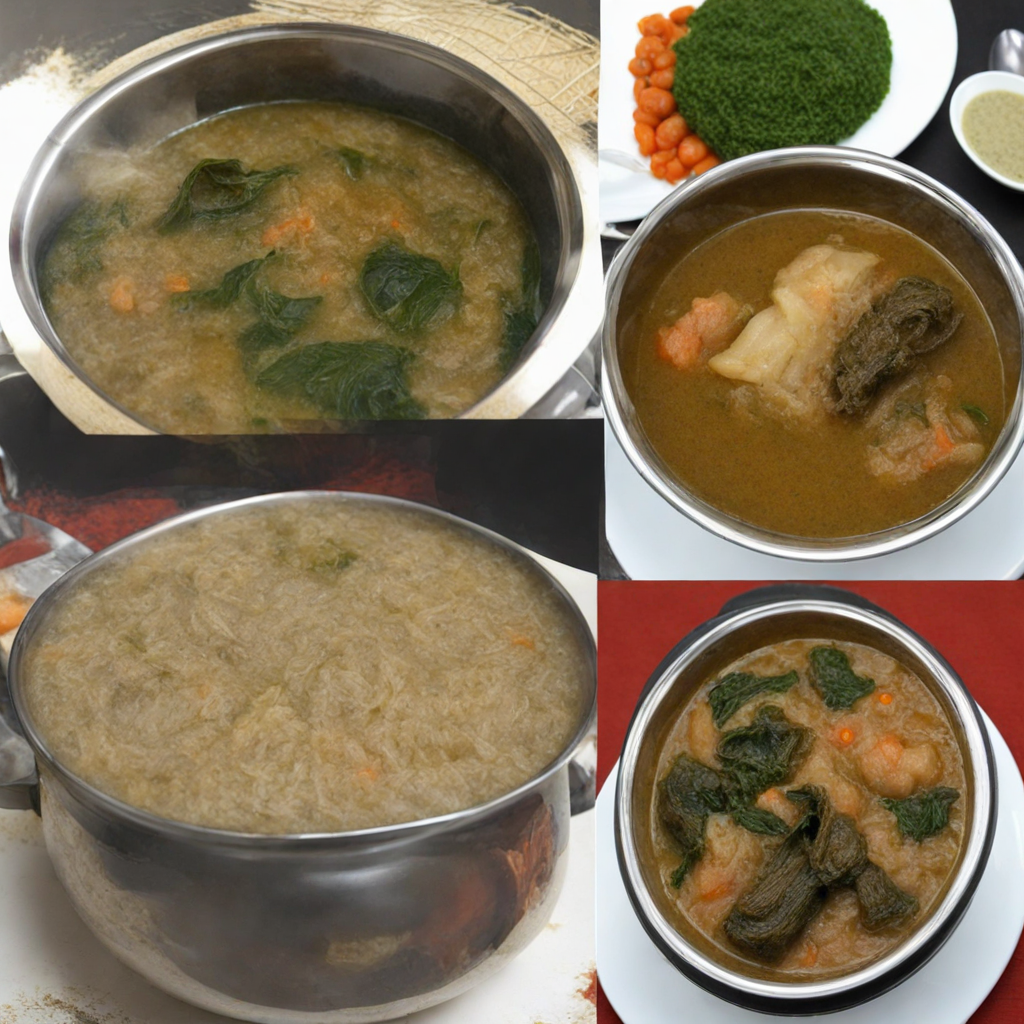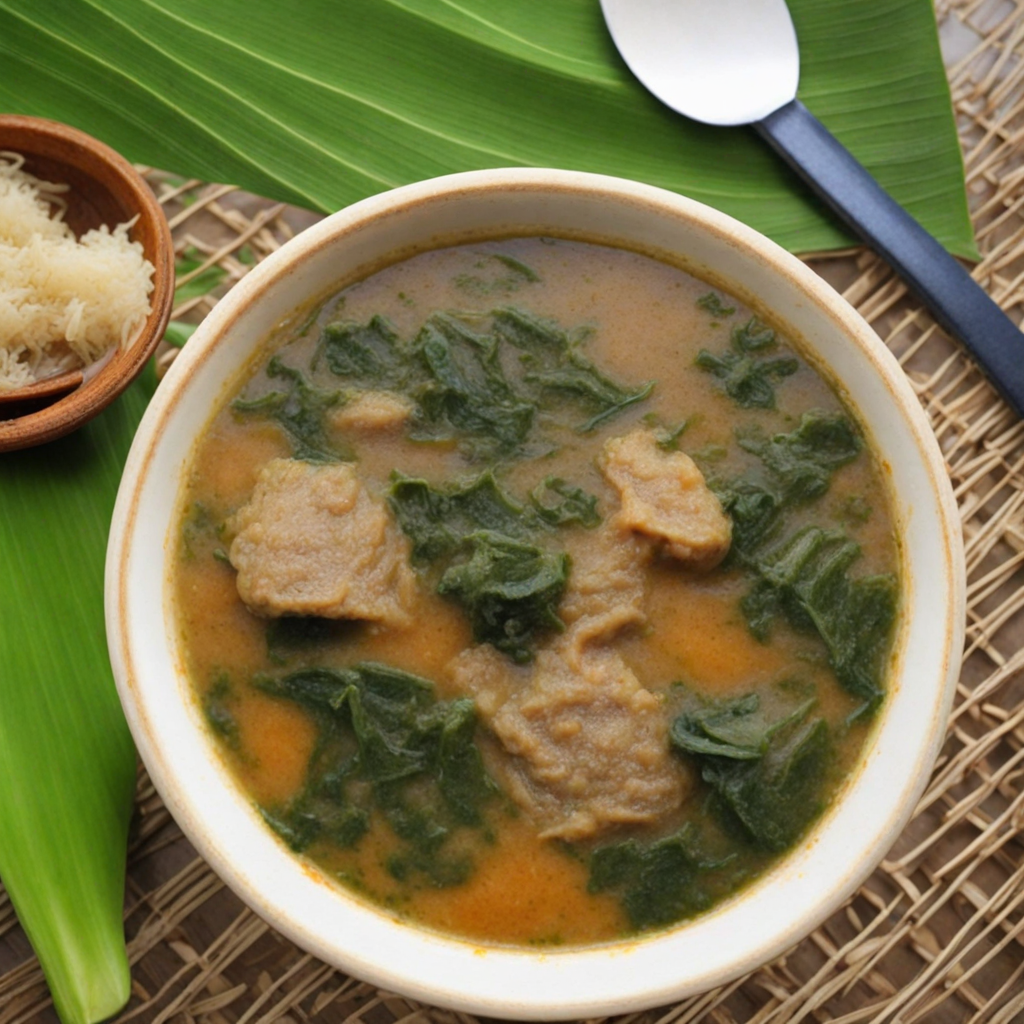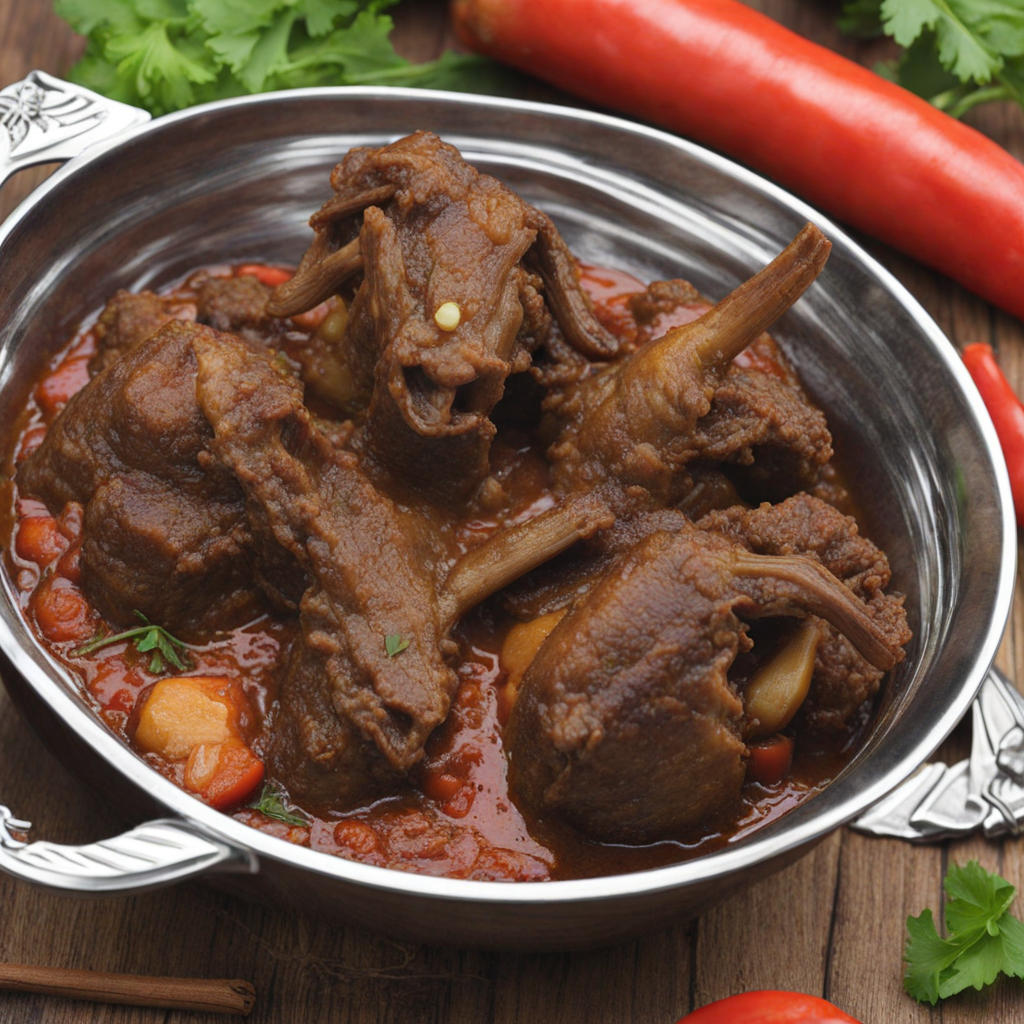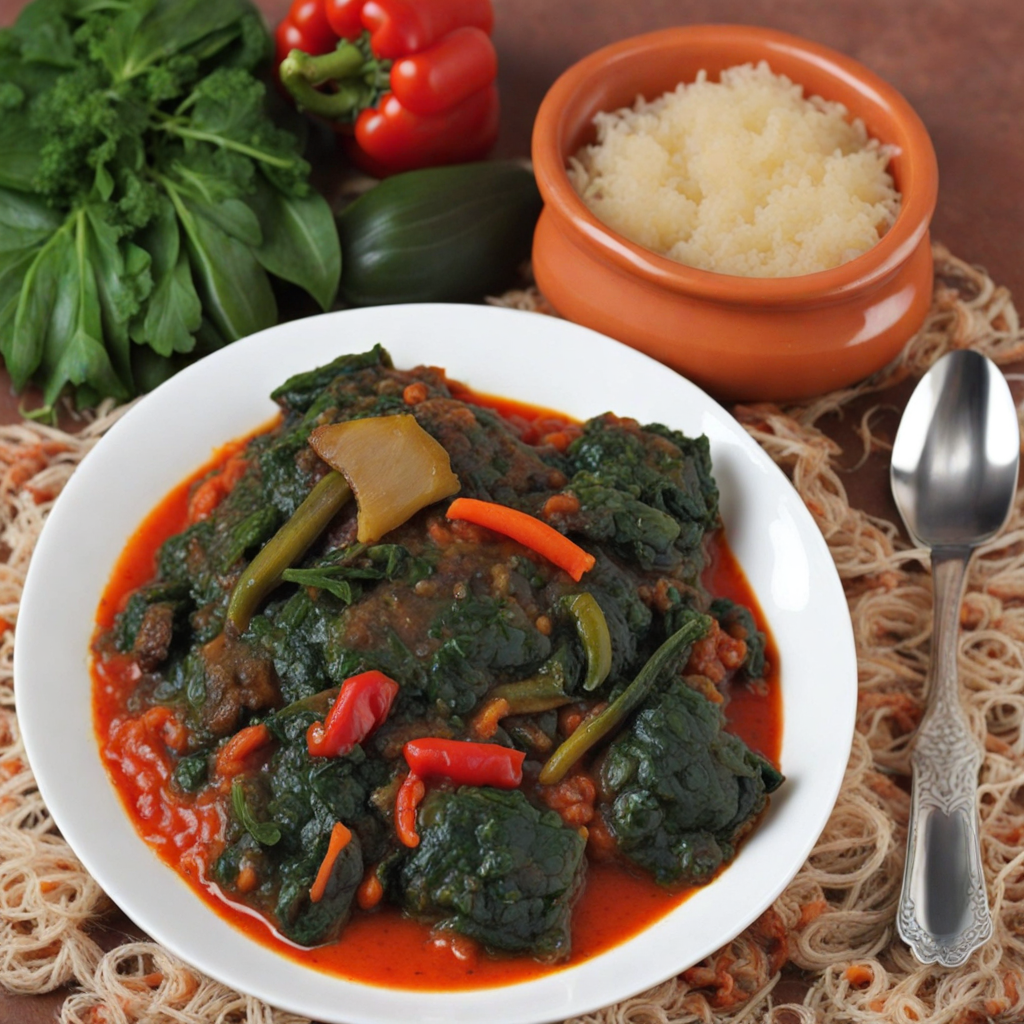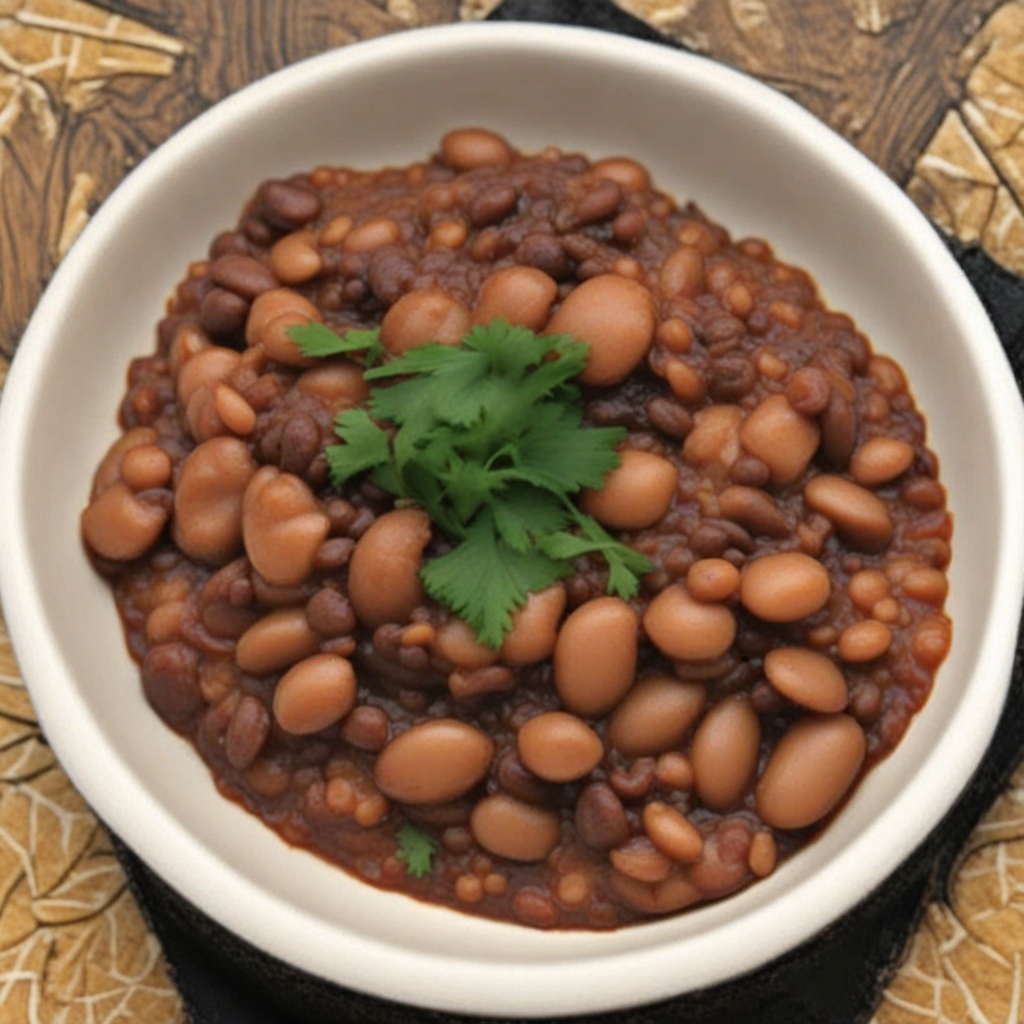Ewedu Soup
Ewedu Soup is a traditional Nigerian dish that showcases the rich culinary heritage of the Yoruba people. It is made primarily from the leaves of the jute plant, which are finely chopped and cooked until they become tender and slimy, creating a unique texture that is both comforting and satisfying. The soup is typically seasoned with ingredients such as locust beans (iru), ground crayfish, and a mix of spices, which contribute to its distinctive earthy flavor. The vibrant green color of the soup is not only visually appealing but also indicative of its fresh and nutritious ingredients, making it a great option for health-conscious food lovers. Often served alongside a variety of swallow dishes like pounded yam, amala, or eba, Ewedu Soup is a versatile accompaniment that enhances the overall dining experience. The thick, viscous nature of the soup allows it to cling to these swallows, providing a delightful contrast in textures. Each bite is a harmonious blend of the rich umami flavors from the locust beans and the subtle nuttiness of the ground crayfish, making it a dish that is both hearty and flavorful. Enjoying Ewedu Soup is not just about the taste; it also embodies a communal aspect of Nigerian culture. Traditionally, it is often shared among family members and friends, emphasizing the importance of togetherness in Nigerian cuisine. Whether you're trying it for the first time or revisiting this beloved dish, Ewedu Soup promises a unique taste experience that captures the essence of Nigerian flavors and traditions.
How It Became This Dish
Ewedu Soup: A Culinary Journey Through Nigeria’s Heritage Ewedu soup, a staple in the culinary tapestry of Nigeria, is a dish that resonates deeply with the cultural identity of the Yoruba people, one of the country’s largest ethnic groups. This rich, green soup, made from the leaves of the jute plant (Corchorus olitorius), is not only celebrated for its unique flavor and nutritional benefits but also holds profound cultural significance that has evolved throughout Nigeria's history. Origins and Historical Context The origins of Ewedu soup can be traced back to ancient agricultural practices in West Africa, where jute, a versatile plant, was cultivated for its fibers and edible leaves. Archaeological evidence suggests that jute has been consumed in various forms for centuries, with its cultivation likely dating back to the time when early agricultural societies began to flourish in the region. In Nigeria, Ewedu has been a fundamental part of Yoruba cuisine, which is characterized by its emphasis on fresh ingredients, vibrant flavors, and the use of local spices. The Yoruba people, known for their rich cultural heritage, have historically embraced Ewedu soup as a symbol of hospitality and community. Traditionally served during family gatherings, festive occasions, and religious ceremonies, this soup has become a dish that embodies the spirit of togetherness. Cultural Significance Ewedu soup is more than just a meal; it is a cultural emblem for the Yoruba people. Its preparation and consumption are often accompanied by various customs and rituals. In Yoruba culture, food plays a central role in social interactions and communal bonding. Ewedu is often paired with a starchy side, such as amala (a dough-like dish made from yam flour) or pounded yam, creating a complete meal that reflects the Yoruba philosophy of balance and harmony in food. Moreover, Ewedu soup is associated with traditional beliefs and practices. The jute leaves are revered for their health benefits, often regarded as a source of vitality and strength. In Yoruba folklore, consuming Ewedu is believed to enhance wisdom and promote longevity, connecting the dish to spiritual and physical well-being. This belief underscores the importance of food not only as sustenance but also as a medium of cultural expression and identity. Development Over Time As Nigeria underwent significant social, economic, and political changes throughout the 20th century, so too did the culinary landscape, including the preparation and consumption of Ewedu soup. The introduction of modern cooking methods and the globalization of food have influenced traditional practices, yet Ewedu has maintained its status as a beloved dish among the Yoruba and beyond. In the early 20th century, with the advent of urbanization and migration, many Yoruba people relocated to cities, bringing their culinary traditions with them. Restaurants began to emerge, serving traditional dishes to a diverse clientele. Ewedu soup became a fixture on menus in urban centers, showcasing its adaptability and wide appeal. This transition marked the beginning of a new era for Ewedu, as it became not only a home-cooked dish but also a culinary ambassador representing Yoruba culture in cosmopolitan settings. In recent years, there has been a renewed interest in traditional Nigerian cuisine, driven by a growing appreciation for culinary heritage and health-conscious eating. Ewedu soup has enjoyed a resurgence, with chefs experimenting with its preparation and presentation. Contemporary interpretations have emerged, incorporating modern culinary techniques while respecting traditional flavors. For instance, some chefs have begun to blend Ewedu with other ingredients, creating fusion dishes that appeal to younger generations and international audiences. Nutritional Value and Modern Adaptations Ewedu soup is celebrated not only for its cultural significance but also for its impressive nutritional profile. The jute leaves are rich in vitamins A, C, and E, as well as essential minerals, making them a valuable addition to any diet. The soup is also low in calories and high in dietary fiber, promoting digestive health. As awareness of healthy eating continues to rise, Ewedu has found its way into the diets of health-conscious individuals, further solidifying its relevance in contemporary cuisine. Modern adaptations of Ewedu soup have also emerged to accommodate diverse dietary preferences. For instance, vegan versions of the soup have gained popularity, replacing traditional meat-based protein sources with plant-based alternatives. Additionally, the use of local ingredients has expanded, with cooks incorporating seasonal vegetables and spices, reflecting the dynamic nature of Nigerian cuisine. Ewedu in Global Context As global interest in African cuisine continues to grow, Ewedu soup has begun to attract attention beyond Nigeria’s borders. Food festivals, culinary events, and cooking classes celebrating Nigerian gastronomy have introduced Ewedu to international audiences, fostering cross-cultural exchanges. The rise of social media has further amplified this trend, allowing food enthusiasts to share recipes, cooking techniques, and personal stories related to Ewedu. In this global context, Ewedu soup serves as a bridge connecting people through food, fostering understanding and appreciation of Yoruba culture. Chefs and home cooks alike are embracing the opportunity to showcase this traditional dish, paving the way for a broader recognition of Nigerian culinary heritage. Conclusion Ewedu soup is more than just a dish; it is a reflection of Nigeria’s rich cultural history, community values, and culinary innovation. From its humble origins in ancient agricultural practices to its modern interpretations in urban kitchens, Ewedu has remained a cherished part of the Yoruba culinary repertoire. As it continues to evolve and adapt, this iconic soup stands as a testament to the enduring power of food to connect people, celebrate heritage, and nourish the body and soul. Whether enjoyed in a bustling restaurant or a family kitchen, Ewedu soup embodies the heart of Nigerian hospitality, inviting all to partake in its rich flavors and cultural significance.
You may like
Discover local flavors from Nigeria


